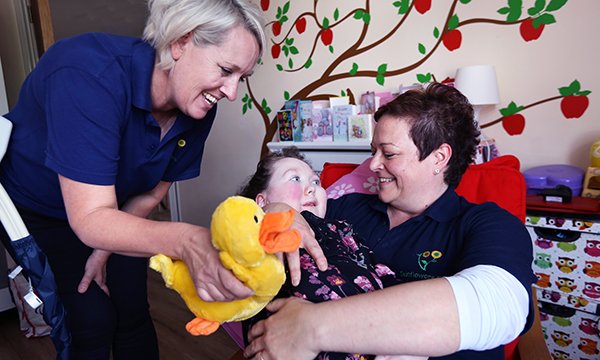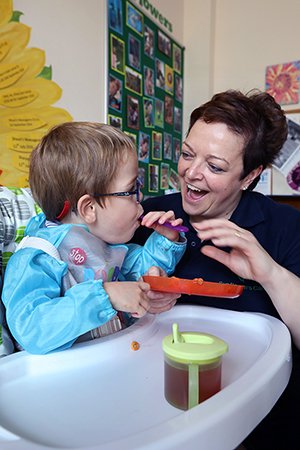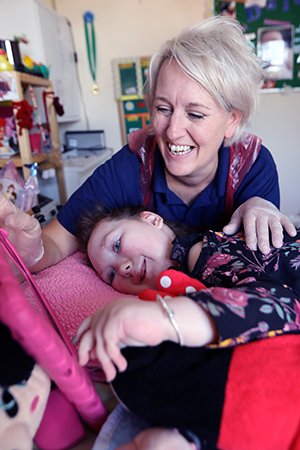‘We left the NHS to create a home for children with complex conditions’

Children’s nurses Lucy Andrews and Karen Higgins took a leap of faith to set up a small nursing home providing a different kind of care for children with complex conditions. Here they tell the story of their struggles and successes

For decades, children’s nurses Lucy Andrews and Karen Higgins worked tirelessly in the NHS. During their careers their paths often crossed, including a time when they shared an office.
They often discussed the problem of children and young people with complex conditions who were effectively growing up in hospital even though they were medically stable. Either their care was too complex to be provided in the family home, or they were waiting for their homes to be adapted for their needs.
‘We have experienced delayed discharges and children and young people growing up in hospital. This is not in the best interests of the child’
Lucy Andrews
Ms Andrews says: ‘We have both worked in paediatric intensive care and community children’s nursing. I was the WellChild Nurse at Cambridge University Hospitals, responsible for the safe and timely discharge of children and young people with complex health needs.’

quickly and for the direct benefit of the
children. It is a dream come true.’
Picture: Tim George
She adds: ‘We have experienced, again and again, delayed discharges and children and young people growing up in hospital.
‘We both felt passionately that this is fundamentally not in the best interests of the child, and wanted to offer the best care for these children and their families. The time frame is so short – we need to nurture the child.’
Coffee break brainstorm
After a particularly bad day, they met for a coffee and soon began talking about how they could deliver a cost-efficient alternative.
‘We believed we could demonstrate significant potential cost savings to deliver a service that meets the holistic and developmental needs of the child and family,’ says Ms Andrews.
They decided to create Sunflowers Care – a nursing home from home for children and young people with complex needs, including long-term ventilation.
‘The children are cared for ably in hospital,’ says Ms Higgins, ‘but we are lucky that we can offer these children and their families such a nice environment.’
They set aside a day a week to do their research and plan.
‘It wasn’t easy,’ says Ms Andrews. ‘We worked tirelessly to realise our shared dreams and vision.
Gap in services
‘Karen and I were seeking a property, securing funding, and starting up a business – despite having no previous business experience – and fully adapting and converting the property while working full-time in our NHS roles.
‘It was a physically, emotionally and financially demanding time in which we were extremely mindful not to generate or provoke a conflict of interest.’
Ms Higgins adds: ‘We researched what we were doing very thoroughly. We went to conferences to clarify that what we thought was missing was actually missing. It is crucial to make absolutely sure that there is a gap in services, and be clear that there is demand for the service you are planning.
‘We used our existing contacts and met with community nurses we had got to know over the years, and staff working in paediatric intensive care.’
Safe and welcoming
Ms Higgins advises anyone thinking of launching their own service to make sure they have the backing and support of family and friends.
‘Once we had sourced the building, with their support we converted it to meet multiple regulations and decorated it to ensure it is safe, child-focused and welcoming,’ says Ms Andrews.
‘We recruited our team, then sourced and delivered intense training to equip them with fundamental knowledge and skills to deliver safe care. We worked with national partners, including long-term ventilation services, to ensure that training was accredited and of a high standard.’
The nurses have found that at Sunflowers they can be more responsive to children’s needs.
‘We can make decisions quickly and for the direct benefit of the children’
Karen Higgins
Ms Higgins explains: ‘We can change things very quickly. That was one of the most frustrating things about working in the NHS, and is one of the very fulfilling parts of our new role. We can make decisions quickly and for the direct benefit of the children. It is a dream come true sometimes.
‘And it can be monumental for parents. They have to fight for everything – these families just don’t have the time or energy.’

demonstrate significant potential cost
savings to deliver a service that meets
the holistic and developmental needs
of the child and family.’
Picture: Tim George
The care at Sunflowers is intensive and funding comes from a variety of sources. Parents might fund short-break care. One little boy spends a night at Sunflowers occasionally so his parents can go out together.
Some use their personal care budgets. Other care is funded by the NHS, clinical commissioning group or social care, depending on the reason for the child being at Sunflowers. For example, if the child is waiting for community professionals to be trained or their home to be adapted, the funding might come from the NHS or social care budgets.
‘A place in a million’
The lack of care for this group of children is a national problem, says Ms Higgins, but for now she and Ms Higgins are not planning to expand by opening another home.
‘Wherever we go we are asked if we could do the same thing in that person’s area, as there is nothing for such children. But Sunflowers is a place in a million and we do not want to dilute the loveliness that we have.’
They are looking instead at supporting children who have lived at Sunflowers when they go out into the community. They are currently considering supporting a school nurse at an academy that has a pupil with complex health needs.
- RELATED: Enabling children to live ordinary lives in extraordinary circumstances through Sunflowers Care
They have no regrets at all about making the leap to quit the NHS and start their own service. It has been extremely busy but is incredibly rewarding, says Ms Higgins.
‘It was a big jump but we still have contact with the NHS. Lots of our staff also still partially work for the NHS, and we still work with a lot of our old colleagues.
‘My advice to anyone who thinks they need to leave the NHS to fill a gap in patient care is to just do it. If you think about it too much and too long you will talk yourself out of it,’ she adds.
‘We knew a lot of people, and were both confident that it was the right time. We have been nurses a long time, and are ingrained with the core values of nursing. Now we can really care for children in the way we want to. We offer very individualised and creative care. I wish we had done it earlier.’
Proving the need for a service like Sunflowers
The nurses began working at Sunflowers full-time in June 2013, with their team starting work in the August. However, they did not accept their first patient until October of that year.
‘Having been able to clearly demonstrate the need for a service like Sunflowers, we had not anticipated the time it would take for professionals to put their faith in a new service and start making referrals,’ says Ms Andrews. ‘By a process of marketing, face-to-face meetings, word of mouth and presenting at study days and conferences, we slowly but surely became a recognisable service.’
Doing something right
Ms Higgins adds: ‘Patients came and they are still coming, so we must be doing something right.’
It can still be feast or famine, says Ms Andrews, but the team uses the quieter times for training and updating competencies. Students also come to them for clinical placements.
‘We love having students, and after placements they have joined our bank. One of our students later showed general ward staff how to do the tapes on a trachy, as nobody else was able to do it.’
They provide a welcoming environment for the children, offering them a wide range of activities and experiences that would not be possible in an acute setting. Ms Andrews adds: ‘One of the children we care for had been in a paediatric intensive care unit for two years prior to transfer to Sunflowers, due to her exceptionally complex and long-term ventilation needs.’
Communication crucial
‘She is now in homeschool five days a week, an active Rainbows member with a group of friends and peers. She is thriving, growing and communicating with assistive technology including Eye Gaze and FaceTime to keep in regular contact with her family.’
Another girl did not communicate at all when she arrived at Sunflowers, says Ms Higgins, but by the time she left she was fluent in the Makaton system, which uses signs and symbols as well as speech.
‘The communication is crucial, as the children are able to get some of their needs across, ' says Ms Higgins. 'It can be so frustrating for all when you don’t know what they are trying to tell you.
‘But because we are a small team we get to know the children, who just thrive when they feel secure.’
RCNi Nurse Awards 2018 open
The search for the best in nursing is under way, with entries open for the RCNi Nurse Awards 2018, the profession’s top accolade.
The awards offer a chance to nominate a colleague or team for their outstanding contribution to care, or share excellent practice with the wider nursing community.
Winning can raise the profile of a specialty or the challenges faced by a particular patient group. The 14 categories celebrating the breadth and depth of the profession are open to nurses, midwives and health visitors registered to practise in the UK, nursing students and those working in health support roles, such as healthcare assistants and assistant practitioners.
The winners will be announced at a ceremony at the Park Plaza Hotel in Westminster on 4 July. The RCN Nurse of the Year, chosen from the category winners, will be revealed on the night.
The deadline for entries is 9 February. For more information or to enter click here
Elaine Cole is managing editor, Nursing Standard
 Lucy Andrews and Karen Higgins were finalists in the Child Health category of the RCNi Nurse Awards 2017. Find out more about the other initiatives short-listed in their category, as well as the award-winning project, here.
Lucy Andrews and Karen Higgins were finalists in the Child Health category of the RCNi Nurse Awards 2017. Find out more about the other initiatives short-listed in their category, as well as the award-winning project, here.

